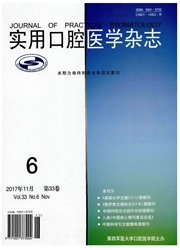

 中文摘要:
中文摘要:
目的:研究新型钛铌锆锡合金(Ti-24Nb-4Zr-7.9Sn,TNZS)表面经过微弧氧化(micro-arcoxidation,MAO)改性后对成骨细胞在其表面的附着计数,增殖特性及碱性磷酸酶(ALP)活性的影响。方法:以光滑纯钛表面作为对照,实验组为未作处理的钛铌锆锡合金和经微弧氧化处理的钛铌锆锡合金,然后对其粗糙度和表面能进行分析,并观察原代培养的成骨细胞在其表面的生长情况。结果:经MAO处理的TNZS表面粗糙度和表面能明显高于未处理TNZS和纯钛组;早期(0.5、1h)细胞附着计数3组之间无明显差异;2h后,细胞在MAO-TNZS表面的附着数高于其他2组;细胞增殖及ALP活性测试中,MAO—TNZS处理组在培养7d和10d后显著高于未处理的TNZS组,而Ti组最低。结论:钛铌锆锡合金表面采用微弧氧化法处理后表面形貌及表面能发生改变,这种改变促进了细胞在其表面的早期附着及细胞的生长和功能表达。
 英文摘要:
英文摘要:
Objective: To study the attachment, proliferation and ALP activity of osteoblasts on Ti-24Nb-4Zr-7, 9Sn (TNZS) alloy surface treated by mieroare oxidation (MAO), Methods: The surface roughness and energy of TNZS before and after MAO treated was examined by physicoehemieal methods, and pure titanium used as control. The primary cultured osteoblasts separated from calvarlum of fetal rats were cultured and the third passage osteoblasts were seeded on 3 different surfaces of Ti, TNZS, MAO-TNZS discs. Biological assays were performed by M3T method. All data were statistically apalyzed. Results: The surface energy and roughness of MAO-TNZS was higher than that of other groups; during 'the initial period of the cell adhesion on the materials, there were no differences among the three teams. But after 2 h, the cells adhesions on the surface of Mao-TNZS were higher than that on smooth surface and Ti ( P 〈 0.05 ). Moreover, a significantly higher cell proliferation of ALP activity was observed on the MAO-TNZS surface than that on the others at 7, 10 d. Conclusion: Modification of TiO2 layer on TNZS surface has a positive influence of the cell behavior on the materials.
 同期刊论文项目
同期刊论文项目
 同项目期刊论文
同项目期刊论文
 期刊信息
期刊信息
